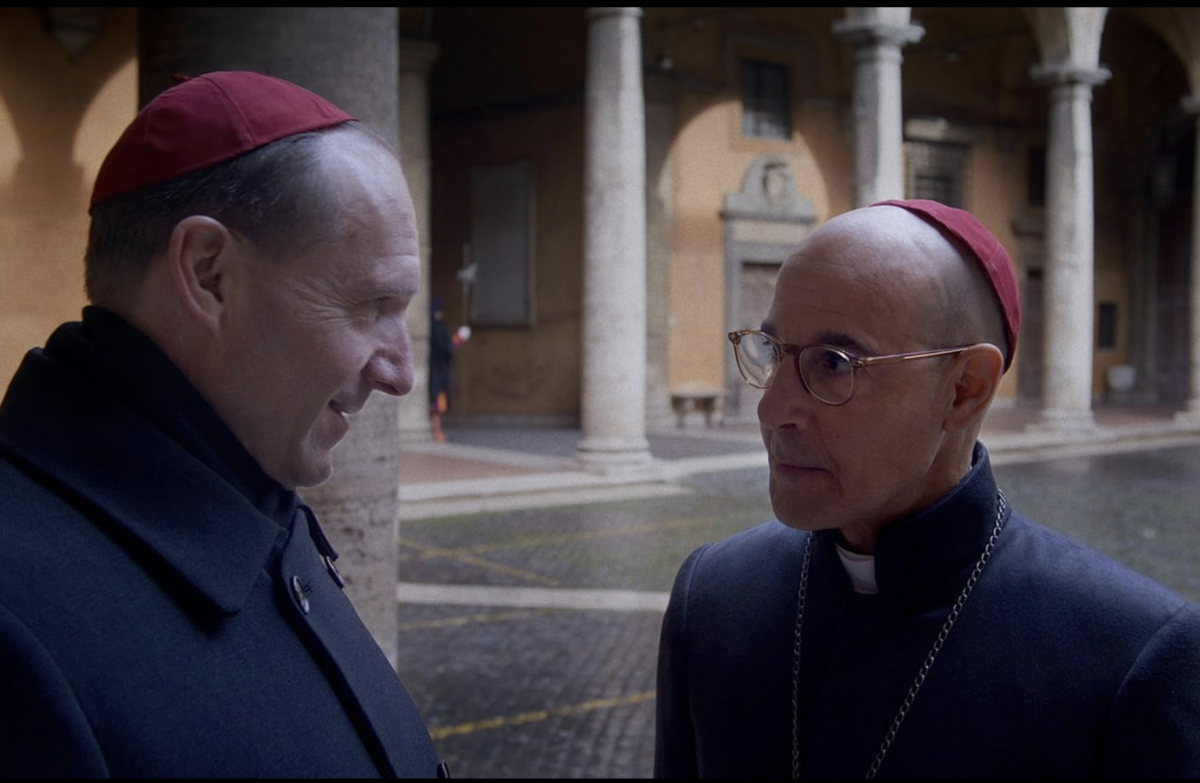Tackling religion in a film is never an easy task. With centuries of context and an array of audiences both critical and staunchly supportive of religious institutions, someone’s bound to be upset. Nevertheless, in recent years filmmakers have boldly explored the detriments of organized religion. Look no further than 2015’s “Spotlight,” which depicts the unraveling of the Archdiocese of Boston sex abuse scandal; even 2024’s “Memoir of a Snail” unabashedly portrays the absurdity of religious fanaticism. In departure from this trend, Oscar-winning director Edward Berger’s newest film “Conclave” fails to provide biting commentary, though its dedicated performances and sharply unexpected plot are certainly admirable.
In “Conclave,” the pope is dead and all the cardinals have gathered in the Vatican to select his successor. Presiding over the centuries-old process is Cardinal Thomas Lawrence (Ralph Fiennes), dean of the College of Cardinals and confidant to the late pope. But just before the conclave can begin, a young Mexican archbishop named Vincent Benitez (Carlos Diehz) arrives claiming the pope secretly made him a cardinal just before his death. From there, we’re treated to twists and turns galore as Lawrence uncovers more secrets than he could have ever expected.
Fiennes decidedly steals the show. He carries himself with such gravitas and conviction that you can’t help but intently watch his every move. From solitary moments of vulnerability to heated public confrontations, Fiennes’ dynamic performance builds up the morally-gray Cardinal Lawrence. We share his frustration as he struggles to assemble an alliance and handle the weight of his position as he’s continuously handed compromising information about his colleagues — extramarital affairs, bribery and withholding crucial information.
Drama ensues when Lawrence’s friend Cardinal Aldo Bellini (Stanley Tucci) accuses Cardinal Lawrence of seeking the papacy for himself, an accusation he adamantly denies. But as problematic figures begin to gain traction, Cardinal Lawrence and Cardinal Bellini realize they must galvanize support to secure a progressive future for the church.
One of the most fascinating aspects of “Conclave” is the way its characters personify political and ideological stances. The film illustrates the contemporary problems that followers and leaders of ancient religions must grapple with.
For example, Cardinal Aldo represents sensible progressive sentiments. He wants to continue the social progress of the late pope and is adamant about enlarging the role women play in the Curia — a value he’s told not to advertise for fear of losing support from more conservative cardinals. On the other hand, Cardinal Joshua Adeyemi (Lucian Msamati) represents those who are staunch traditionalists, at least when it comes to social issues. As another cardinal puts it, he “believes that homosexuals should be sent to prison in this world and hell in the next.”
Some have criticized the amalgamation of such ideologies into singular figures, calling it simplistic — which is admittedly true. But the film’s primary objective is to give us a gripping story about betrayal, deceit and lies — that’s not to say that “Conclave” is exclusively concerned with entertainment and disregards substance. In fact, it tackles archaic gender roles, ideological polarization and even the taboo of gender identity.
The issue is that the film does attempt to talk about progressive sentiments in the church rings hollow. At a time when the Archdiocese of Los Angeles just agreed to an $880 million settlement with victims of clergy sexual abuse, why is the type of Church-centered story “Conclave” tells necessary? Sexual abuse of children is mentioned in passing a mere two or three times in the film, but it’s only in the context of the rightfully negative picture such scandals paint of the church. How can we be expected to get swept up in the tribulations Cardinal Lawrence faces when he, along with all the others, perpetuates a system so unshakably tied to abuse? The film never truly justifies itself on this front.
In this vein, “Conclave” starts to feel less like a sincere attempt to provide meaningful insight into the Catholic Church and more like an awards vehicle for stars like Fiennes, Tucci and John Lithgow. After his 2022 war film, “All Quiet on the Western Front,” took home four Academy Awards, director Berger has seemingly acquired a taste for the famous gold trophies. Watching “Conclave,” you get the sense that Berger did not make this film because he cares deeply about peeling back the curtain on Vatican politics. And that’s unfortunate, because the best films are always those where you can feel the filmmaker’s passion brimming in scene — in “Conclave,” that’s just not the case.
Contact Leo Field at [email protected].























































































































































